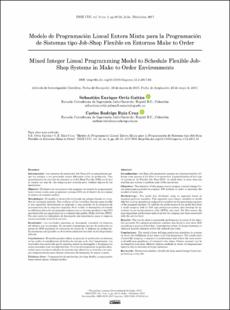Mostrar el registro sencillo del ítem
Modelo de Programación Lineal Entera Mixta para la Programación de Sistemas tipo Job-Shop Flexible en Entornos Make to Order
| dc.contributor.author | Ortiz Gaitán, Sebastián Enrique | |
| dc.contributor.author | Ruiz, Carlos Rodrigo | |
| dc.date.accessioned | 2021-07-01T18:00:35Z | |
| dc.date.accessioned | 2021-10-01T17:37:31Z | |
| dc.date.available | 2021-07-01T18:00:35Z | |
| dc.date.available | 2021-10-01T17:37:31Z | |
| dc.date.issued | 2017 | |
| dc.identifier.issn | 0122-6517 | |
| dc.identifier.uri | https://repositorio.escuelaing.edu.co/handle/001/1615 | |
| dc.description.abstract | Introducción: Los sistemas de producción Job Shop (JS) se caracterizan porque los trabajos a ser procesados tienen diferentes rutas de producción. Una generalización de este tipo de sistemas es el Job Shop Flexible (FJS), en el cual se cuenta con más de una máquina por estación para realizar alguna de las operaciones. Objetivo: El objetivo de este proyecto fue proponer un modelo de programación lineal entera mixta para programar sistemas FJS con el objetivo de minimizar el número de trabajos tardíos. Metodología: El modelo se desarrolló utilizando un enfoque basado en variables de secuencia-posición. Este enfoque utiliza variables binarias para decidir si una operación determinada es asignada a una posición en la secuencia de procesamiento de la máquina asignada. Para validar el desempeño del modelo se utilizaron datos de una pequeña empresa con un sistema productivo tipo FJS que desarrolla sus operaciones en un entorno bajo pedido (Make to Order, MTO). Por esta razón los indicadores de desempeño más importantes para la empresa son los asociados al nivel de servicio. Resultados: Los resultados muestran un desempeño razonable en términos del objetivo que se persigue. Se encontró el programa óptimo de producción en menos de 3600 segundos en instancias de menos de 14 órdenes de producción. En instancias más grandes su obtuvieron soluciones factibles en el tiempo límite definido. Conclusiones: El modelo permite definir programas de producción en sistemas en los cuales el cumplimiento de fechas de entrega es de vital importancia. Los resultados han permitido que la empresa mejore su desempeño y disminuya los costos asociados a los incumplimientos. Futuras investigaciones se pueden desarrollar para encontrar métodos de solución más eficientes con relación a los tiempos computacionales para obtener soluciones de instancias de mayor tamaño. | spa |
| dc.description.abstract | Introduction− Job Shop (JS) production systems are characterized by dif-ferent route process of the Jobs to be processed. A generalization of this type of systems is the Flexible Job Shop (FJS), in which there is more than one machine per station to perform some of the operations. Objective−The objective of this project was to propose a mixed integer lin-ear programming model to program FJS systems in order to minimize the number of tardy jobs. Methodology−The model was developed using an approach based on sequence-position variables. This approach uses binary variables to decide whether a given operation is assigned to a position in the processing sequence of the assigned machine. To validate the performance of the model data from a small company with an FJS type production system, that develops its op-erations in an environment to order (MTO), was used. For this reason, the most important performance indicators for the company are those associated with the service level. Results−The results show a reasonable performance in terms of the objec-tive pursued. The optimal production schedule was found in less than 3600 seconds in instances of less than 14 production orders. In larger instances, it obtained feasible solutions within the defined time limit. Conclusions−The model allows defining production schedules in systems in which the fulfillment of due dates is of vital importance. The results have allowed the company to improve its performance and reduce the costs associ-ated with non-compliance of customer’s due dates. Future research can be developed to find more efficient solution methods in terms of computational times to obtain solutions of larger instances. | eng |
| dc.format.extent | 7 páginas | spa |
| dc.format.mimetype | application/pdf | spa |
| dc.language.iso | spa | spa |
| dc.publisher | Universidad de la Costa | spa |
| dc.rights.uri | https://creativecommons.org/licenses/by-nc-nd/4.0/ | spa |
| dc.source | https://revistascientificas.cuc.edu.co/index.php/ingecuc/article/view/1508 | spa |
| dc.title | Modelo de Programación Lineal Entera Mixta para la Programación de Sistemas tipo Job-Shop Flexible en Entornos Make to Order | spa |
| dc.title.alternative | Mixed Integer Lineal Programming Model to Schedule Flexible Job-Shop Systems in Make to Order Environments | eng |
| dc.type | Artículo de revista | spa |
| dc.description.notes | Escuela Colombiana de Ingeniería Julio Garavito. Bogotá D.C., Colombia sebastian.ortiz-g@mail.escuelaing.edu.co Escuela Colombiana de Ingeniería Julio Garavito. Bogotá D.C., Colombia carlosr.ruiz@escuelaing.edu.co | spa |
| dc.type.version | info:eu-repo/semantics/publishedVersion | spa |
| oaire.accessrights | http://purl.org/coar/access_right/c_abf2 | spa |
| oaire.version | http://purl.org/coar/version/c_970fb48d4fbd8a85 | spa |
| dc.identifier.doi | 10.17981/ingecuc.13.2.2017.03 | |
| dc.identifier.url | http://dx.doi.org/10.17981/ingecuc.13.2.2017.03 | |
| dc.publisher.place | Barranquilla, Colombia. | spa |
| dc.relation.citationedition | INGE CUC, vol. 13 no. 2, pp 28-34, Julio - Diciembre, 2017. | spa |
| dc.relation.citationendpage | 34 | spa |
| dc.relation.citationissue | 2 | spa |
| dc.relation.citationstartpage | 28 | spa |
| dc.relation.citationvolume | 13 | spa |
| dc.relation.indexed | N/A | spa |
| dc.relation.ispartofjournal | INGE CUC | spa |
| dc.relation.references | C. Özgüven, Y. Yavuz, and L. Özbakir, “Mixed integer goal programming models for the flexible job-shop scheduling problems with separable and non-separable sequence dependent setup times,” Appl. Math. Model., vol. 36, no. 2, pp. 846–858, 2012. Disponible: http://dx.doi.org/10.1016/j.apm.2011.07.037 | spa |
| dc.relation.references | M. Mastrolilli and L. M. Gambardella, “Effective Neighborhood Functions for the Flexible Job Shop Problem!,” J. Sched., vol. 3, no. 1, pp. 3–20, 1999. Disponible: http://dx.doi.org/10.1002/(SICI)1099-1425(200001/02)3:1<3::AID-JOS32>3.0.CO;2-Y | spa |
| dc.relation.references | C. R. Scrich, V. A. Armentano, and M. Laguna, “Tardiness Minimization in a Flexible Job Shop: A Tabu Search Approach,” J. Intell. Manuf., vol. 15, no. 1, pp. 103–115, 2004. Disponible: http://dx.doi.org/10.1023/B:JIMS.0000010078.30713.e9 | spa |
| dc.relation.references | Z. Wu and M. X. Weng, “Multiagent scheduling method with earliness and tardiness objectives in flexible job shops,” IEEE Trans. Syst. Man, Cybern. Part B, vol. 35, no. 2, pp. 293–301, 2005. Disponible: https://doi.org/10.1109/TSMCB.2004.842412 | spa |
| dc.relation.references | N. Zribi, A. El Kamel, and P. Borne, “Total tardiness in a flexible job-shop,” in IMACS Multiconference on “Computational Engineering in Systems Applications”, CESA, 2006, pp. 1543–1549. Disponible: https://doi.org/10.1109/CESA.2006.4281882 | spa |
| dc.relation.references | J. C. Tay and N. B. Ho, “Evolving dispatching rules using genetic programming for solving multi-objective flexible job-shop problems,” Comput. Ind. Eng., vol. 54, no. 3, pp. 453–473, 2008. Disponible: https://doi.org/10.1016/j.cie.2007.08.008 | spa |
| dc.relation.references | A. Baykasoglu and L. Özbakir, “Analyzing the effect of dispatching rules on the scheduling performance through grammar based flexible scheduling system,” Int. J. Prod. Econ., vol. 124, no. 2, pp. 369–381, 2010. Disponible: https://doi.org/10.1016/j.ijpe.2009.11.032 | spa |
| dc.relation.references | K. Thörnblad, “On the optimization of schedules of a multitask production cell,” 2011. Disponible: http://publications.lib.chalmers.se/records/fulltext/144904.pdf | spa |
| dc.relation.references | J. C. Chen, C.-C. Wu, C.-W. Chen, and K.-H. Chen, “Flexible job shop scheduling with parallel machines using Genetic Algorithm and Grouping Genetic Algorithm,” Expert Syst. Appl., vol. 39, no. 11, pp. 10016–10021, 2012. Disponible: https://doi.org/10.1016/j.eswa.2012.01.211 | spa |
| dc.relation.references | L. Lin, M. Gen, Y. Liang, and K. Ohno, “A hybrid EA for reactive flexible job-shop scheduling,” in Procedia Computer Science, 2012, vol. 12, pp. 110–115. Disponible: https://doi.org/10.1016/j.procs.2012.09.039 | spa |
| dc.relation.references | M. C. Gomes, A. P. Barbosa-Póvoa, and A. Q. Novais, “Reactive scheduling in a make-to-order flexible job shop with re-entrant process and assembly: a mathematical programming approach,” Int. J. Prod. Res., vol. 51, no. 17, pp. 5120–5141, 2013. Disponible: http://dx.doi.org/10.1080/00207543.2013.793428 | spa |
| dc.relation.references | R.-H. Huang, C.-L. Yang, and W.-C. Cheng, “Flexible job shop scheduling with due window—a two-pheromone ant colony approach,” Int. J. Prod. Econ., vol. 141, no. 2, pp. 685–697, 2013. Disponible: https://doi.org/10.1016/j.ijpe.2012.10.011 | spa |
| dc.relation.references | M. Mousakhani, “Sequence-dependent setup time flexible job shop scheduling problem to minimise total tardiness,” Int. J. Prod. Res., vol. 51, no. 12, pp. 3476–3487, 2013. Disponible: http://dx.doi.org/10.1080/00207543.2012.746480 | spa |
| dc.relation.references | A. Sadrzadeh, “Development of Both the AIS and PSO for Solving the Flexible Job Shop Scheduling Problem,” Arab. J. Sci. Eng., vol. 38, no. 12, pp. 3593–3604, Dec. 2013. Disponible: http://doi.org/10.1007/s13369-013-0625-y | spa |
| dc.relation.references | K. Thörnblad, A.-B. Strömberg, M. Patriksson, and T. Almgren, “An efficient algorithm for solving the flexible job shop scheduling problem,” in 25th NOFOMA conference proceedings, June 3-5 2013, Göteborg, Sweden, 2013. Disponible: http://publications.lib.chalmers.se/records/fulltext/181796/local_181796.pdf | spa |
| dc.relation.references | G. Calleja and R. Pastor, “A dispatching algorithm for flexible job-shop scheduling with transfer batches: an industrial application,” Prod. Plan. Control, vol. 25, no. 2, pp. 93–109, 2014. Disponible: http://dx.doi.org/10.1080/09537287.2013.782846 | spa |
| dc.relation.references | Y. Liu, H. Dong, N. Lohse, S. Petrovic, and N. Gindy, “An investigation into minimising total energy consumption and total weighted tardiness in job shops,” J. Clean. Prod., vol. 65, pp. 87–96, 2014. Disponible: https://doi.org/10.1016/j.jclepro.2013.07.060 | spa |
| dc.relation.references | H. Na and J. Park, “Multi-level job scheduling in a flexible job shop environment,” Int. J. Prod. Res., vol. 52, no. 13, pp. 3877–3887, 2014. Disponible: http://dx.doi.org/10.1080/00207543.2013.848487 | spa |
| dc.relation.references | K. Z. Gao, P. N. Suganthan, Q. K. Pan, T. J. Chua, T. X. Cai, and C. S. Chong, “Discrete harmony search algorithm for flexible job shop scheduling problem with multiple objectives,” J. Intell. Manuf., vol. 27, no. 2, pp. 363–374, Apr. 2016. Disponible: http://doi.org/10.1007/s10845-014-0869-8 | spa |
| dc.relation.references | O. Faura Gatius, “Flexible Job-Shop Problem minimizando los costes en función de la fecha de entrega y el instante de realización,” Universitat Politécnica de Catalunya, 2016. Disponible: http://hdl.handle.net/2117/98534 | spa |
| dc.relation.references | A. Türkyılmaz and S. Bulkan, “A hybrid algorithm for total tardiness minimisation in flexible job shop: genetic algorithm with parallel VNS execution,” Int. J. Prod. Res., vol. 53, no. 6, pp. 1832–1848, Mar. 2015. Disponible: http://dx.doi.org/10.1080/00207543.2014.962113 | spa |
| dc.relation.references | Y. Demir and S. Kürşat Işleyen, “Evaluation of mathematical models for flexible job-shop scheduling problems,” Appl. Math. Model., vol. 37, no. 3, pp. 977–988, 2013. Disponible: https://doi.org/10.1016/j.apm.2012.03.020 | spa |
| dc.rights.accessrights | info:eu-repo/semantics/openAccess | spa |
| dc.rights.creativecommons | Atribución-NoComercial-SinDerivadas 4.0 Internacional (CC BY-NC-ND 4.0) | spa |
| dc.subject.armarc | Programación lineal | spa |
| dc.subject.armarc | Linear programming | eng |
| dc.subject.armarc | Programación (Matemáticas) | spa |
| dc.subject.armarc | Programming (Mathematics) | eng |
| dc.subject.proposal | Programación de producción | spa |
| dc.subject.proposal | Job Shop Flexible | spa |
| dc.subject.proposal | Programación lineal entera mixta | spa |
| dc.subject.proposal | Trabajos tardíos | spa |
| dc.subject.proposal | Production schedule | eng |
| dc.subject.proposal | Flexible job shop | eng |
| dc.subject.proposal | Mixed integer lineal pro-gramming | eng |
| dc.subject.proposal | Tardy jobs | eng |
| dc.type.coar | http://purl.org/coar/resource_type/c_2df8fbb1 | spa |
| dc.type.content | Text | spa |
| dc.type.driver | info:eu-repo/semantics/article | spa |
| dc.type.redcol | http://purl.org/redcol/resource_type/ART | spa |
Ficheros en el ítem
Este ítem aparece en la(s) siguiente(s) colección(ones)
-
AI - Centro de Investigación en Manufactura y Servicios – CIMSER [59]
Clasificación: B- Convocatoria 2018.











